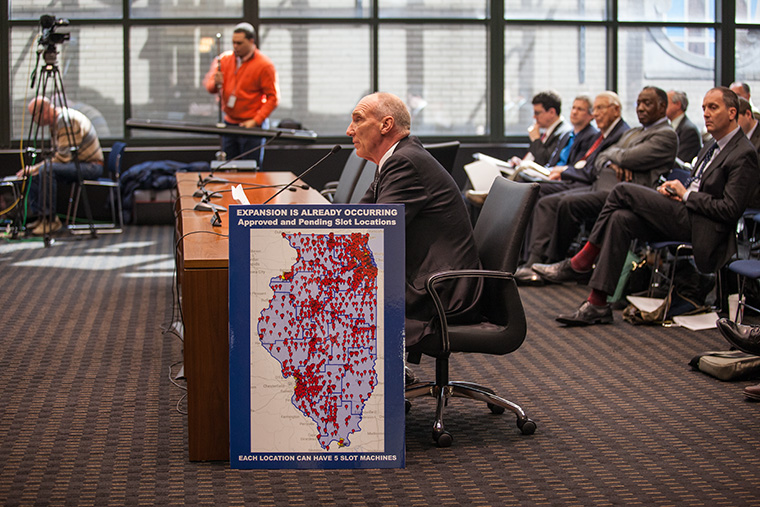Chicago casinos gamble on South Loop
April 21, 2014
Chicago’s decades-old casino debate is resurfacing as lawmakers push to create a state-owned gambling facility in the South Loop.
During an April 15 public hearing, Rep. Bob Rita (D–Blue Island) testified that amending the Chicago Casino Development Authority Act to allow casinos to build within city limits would generate substantial revenue for the state.
Rita is the sponsor of two amendments to the act, the first of which would allow for the construction of Chicago’s first casino—which would include more than 10,000 gambling devices, equivalent to more than eight riverboat casinos—and share profits with both the city and state. The second amendment calls for the opening of a smaller Chicago casino with up to 6,000 devices and four other casinos in Illinois suburbs.
Supporters claim the state-owned facilities would lead to economic growth, but critics argue there is not enough demand for casinos considering Illinois casino revenue has declined by as much as 50 percent in the past year, according to Tom Swoik, executive director of the Illinois Casino Gaming Association.
Video slot machines, commonly referred to as video game gambling, have hindered the casino industry because they are conveniently located in bars and restaurants, so there is less of a reason to travel to casinos, Swoik said. The state began regulating the machines, limiting business owners to five in 2012.
“If you see the figures month to month, there is a significant drop and it’s across the board,” said Caleb Melamed, an attorney for the Illinois Gaming Board, which regulates Illinois casinos. “A lot of people thought video gaming would not affect gambling and it does. You can’t act in isolation.”
People are still able to gamble in suburban areas where there are no nearby casinos because they have access to slot machines in restaurants and bars, according to Swoik, who said he is uncertain whether a Chicago casino would be financially successful.
“We’re not creating new gamblers,” Swoik said. “This is a question of supply and demand. Creating new supply in a saturated market does not create demand.”
Despite concern that there is already too much competition for casinos, Rita maintains that gaming machines and traditional casinos are not comparable because they do not offer the same social setting and do not appeal to all gamblers.
“They talk about video gaming and how it is saturating the market, but we just regulated that,” Rita said. “There is no way in the world it is saturating the market. How could that be an argument?”
Kim Goluska, president of Chicago Consultants Studio Inc., echoed Rita’s claims, adding that a Chicago casino would provide the state with a consistent revenue stream and create thousands of job opportunities for service workers.
Goluska said a South Loop casino would encourage both domestic and international tourism because it could draw gamblers from across the globe. He projected that a downtown casino would create 17,000 jobs and generate more than $6.5 billion annually.
More casinos would help alleviate the state’s $7 billion deficit but could easily become corrupt, said Art Bilek, executive vice president of the Chicago Crime Commission. Bilek said he would not oppose a Chicago casino as long as it would not be state-operated. Based on Illinois’ history of corrupt politicians, Bilek said he doubts revenue generated through a state-run casino would be managed ethically, adding that privately owned casinos would benefit the state’s economy by providing employment opportunities and encouraging tourism.
“It should be understood that a casino is not for campaign donations or for a political job,” Bilek said. “It would open the gaming industry to unnecessary risks in the area of government corruption.”
Melamed said he is concerned with state control of the facility and the difficulty of establishing an organized committee to regulate the casinos. He said he anticipates the casino will be difficult to regulate, adding that Kansas is the only state that operates a casino, but that it is not jointly shared with a city. However, Melamed said he is open to revising the legislation and wants a Chicago casino to be successful but stressed that the large size of the proposed casino coupled with the declining demand for gambling facilities worries him.
“We don’t want casinos to fail,” Melamed said. “There are significant questions about saturation in the Illinois gaming market and this is a significant expansion.”








